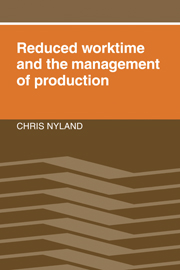1 - The history of worktime thought
Published online by Cambridge University Press: 25 March 2010
Summary
The development of capitalism has been accompanied by major changes to the length of time the direct producers normally spend at their place of employment. Through the two centuries 1500 to 1700, for example, British worktimes tended to increase. Since this period these times have progressively contracted with sporadic reductions in time standards tending to characterise the labour market overall (Bienefeld 1972: 9). As traditional worktime patterns began to change in the fourteenth century, a debate arose as to why the time workers normally labour should tend to be subject to widespread and sustained variation. The debate has continued to the present day. This work will begin by examining the major theoretical contributions that have been put forward to explain this phenomenon. Because of the leading role formerly held by British economic theorists, the survey will primarily utilise the experiences of that nation.
Prior to the middle years of the eighteenth century those individuals who wrote on economic topics, with very few exceptions, took it as given that the direct producers were innately slothful. They invariably insisted that working people would not labour longer or harder than was necessary to satisfy those minimal wants to which they aspired, unless they were forced to by hunger or terror. The essence of their belief is encapsulated in Arthur Young's maxim that “everyone but an idiot knows that the lower classes must be kept poor or they will never be industrious.” The claim that workers would reduce their supply of labour power if its price was increased was irrational in terms of the supply-and-demand analysis economic writers tended to find attractive even before the rise of classical economics.
- Type
- Chapter
- Information
- Reduced Worktime and the Management of Production , pp. 1 - 36Publisher: Cambridge University PressPrint publication year: 1989



